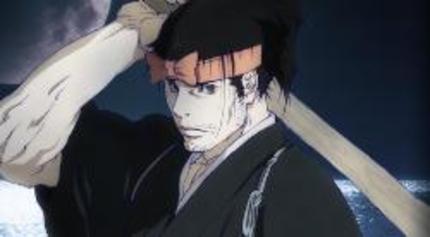Sitges 09: MUSASHI, THE DREAM OF THE LAST SAMURAI Review

To all of those out there who began to have visions of a full on samurai epic when the heard Ghost In The Shell director Mamoru Oshii had scripted a new animated feature based on the life of legendary swordsman Miyamoto Musashi, I have a piece of advice. Disabuse yourself of those notions right now. Yes, Musashi: The Dream Of The Last Samurai does indeed boast a script by the legendary animator and, yes, it is very much rooted in the life of the swordsman. But forget epic. For that matter, forget narrative. Musashi is in no way, shape or form a narrative feature. Rather it is a type of animated documentary, essentially an hour and fifteen minute essay written by Oshii laying out his own theory on the roots of Musashi's fighting style.
For those unfamiliar, Musashi was a historical figure who lived in the early 1600's, pioneering a unique two-sword style of fighting and penning a book of military strategy that is still very highly thought of. Over the centuries Musashi has attained a sort of mythical status, a status that Oshii is very much interested in deflating to get to the man behind the legends while proposing his own theory that Musashi's work was based largely on a lifelong obsession with horse-mounted warriors, an obsession that began when Musashi was soundly defeated by a horse-warrior in his very first military campaign when just a teenager.
Musashi the film skips through key moments of Musashi the man's life while also laying in occasional bits of contextual information as it pertains to Oshii's own theories and here we arrive at one of the two key problems in the film, namely that Oshii has very clearly written it with the assumption that his audience already has a very detailed knowledge of Musashi's life and legend. This may be the case in Japan - though I kind of doubt it on the scale that will be required to make the film a popular success - but it is very definitely not so outside of Japan's borders. The film spends no time on Musashi's childhood and makes no attempt to put key moments into context, assuming that you - the viewer - already know all of these things. A greater percentage of the running time is actually devoted to sideline digressions - there's a particularly extensive one on the role of horse-bound knights in middle-ages Europe and the development and use of crossbows - than there is on any contextualizing of Musashi himself. Which means that for an audience not already well familiar with the man there is precious little to hang Oshii's ideas on.
Also troublesome is the film's extreme mish-mash of visual styles. While the flashbacks into Musashi's life are rendered in gorgeous animation in a distinctive Production IG style there is significantly less of that material than you may expect going in, with the remainder filled out with touches of actual live action footage of the sites referred to, cutesy 2D CG animation - think the mini-Pato shorts that accompanied the third Patlabor feature - and the entire film narrated by a poorly rendered 3D CGI mock-historian who also supplies very unfunny comic relief. Beyond the simple point that the styles never mesh into a cohesive whole and that some of the approaches seem very poorly suited to the material, the film often seems to be jumping from style to style to simply keep the eye so occupied that the mind forgets that it's essentially parked in front of a highly specialized and very specific university lecture.
A visual essay that, frankly, would have been best served by remaining a print essay, Musashi is very likely the least commercial film in the Oshii canon. There's no doubt that Oshii himself has a passion for the material but the film provides so little to draw in viewers that don't already share Oshii's very specific interests that it's hard to imagine anyone outside of a very small cult particularly caring.







